A - Da reverência e piedosa homenagem que se deve aos santos pertencentes a igreja triunfante, que já desfruta da realeza com Cristo Jesus Nosso Senhor no mundo espiritual.
01) Igreja apostólica assíria:
No livro de Grant - The nestorians, or, the lost tribes, 1841 - Badger - The nestorians and their rituals, 1852 - e outros min a Igreja Assíria é descrita como uma espécie de seita protestante, infensa ao culto que as santas Igrejas de Deus sempre prestaram aos amigos e imitadores de Nosso Senhor Jesus Cristo.
Eis porém o que nos é revelado por seu confrade - tanto mais honesto - Pr. G P Badger (in The Nestorians and their rituals, London, 1852) :
"Os seguintes extratos são suficientes para mostrar o ensino da Igreja nestoriana a esse respeito:
- Invocação direta de Santos >
Da coleção de coleta no fim do Khudhra. "Santos profetas, apóstolos, doutores, confessores, mártires, padres e eremitas, empenhai-vos em interceder por nós diante de Cristo e que por meio de vossas preces sejamos atendidos e ricamente abençoados." Coleta do Khudhra
"Santos padres e doutores que nos anunciastes a verdade divina, intercedei por nós diante do Senhor e grangeai a salvação de nossas almas." Gezza para a comemoração dos doutores de athurieh
- Invocação indireta dos santos>
"Que as orações dos profetas que revelaram antecipadamente os teus mistérios, com as orações dos apóstolos que pregaram o teu Evangelho, com as orações dos mártires, dos padres e dos doutores, 0h Jesus, sirvam de apoio e sustento para teus adoradores e servos." oo d' de Kdham Wathar."" vol II, pp 136 sgs
Outras dezenas, quiça centenas, de peças como estas podem ser encontradas nos livros religiosos da Igreja Persa, testificando que - em que pesem as cínicas e deslavadas mentiras do sr Grant - o sentir desta igreja não destoa em absolutamente nada dos entir das demais igrejas plantadas pelos abençoados apóstolos do Verbo encarnado e que ele não corrobora nem de longe os falsos e perversos ensinamentos das seitas ocidentais.
02) Igreja apostólica Copta:
"We ask the intercession of the saints because of the great
favour they have with the Lord who loves them and puts them
in charge of merciful deeds for the sake of men. Also because of
the greater knowledge and extensive capabilities their souls
enjoy after leaving their bodies." Patriarca Shenouda III in "Teologia comparativa" III
favour they have with the Lord who loves them and puts them
in charge of merciful deeds for the sake of men. Also because of
the greater knowledge and extensive capabilities their souls
enjoy after leaving their bodies." Patriarca Shenouda III in "Teologia comparativa" III
03) Igreja apostólica armênia:
"A igreja armênia venera todos os santos do Antigo Testamento, especialmente os patriarcas, profetas, mártires da deportação e todos os Santos do Evangelho, os apóstolos, os discípulos, os primeiros diaconos, os mártires, os padres, as santas mulheres, etc." Khazinedjian id pp 52
04) Igreja apostólica siríaca:
"Dias há consagrados pela Igreja aos anjos e as memórias dos Santos, a finalidade de tais memórias é que reverenciando-os nos tornemos semelhantes a eles." Patriarca Zacarias Iwas in "Os anjos"
05) Igrejas apostólicas Bizantinas:
"Mesmo tendo Noso Senhor Jesus Cristo como advogado e propiciação pelos pecados, em nossas orações e súplicas a Ele, podemos recorrer aos santos como intercessores." Doshiteus in Decreto VIII
"Não é por ignorar os atributos divinos e a suprema adoração que se deve ao Criador que recorremos as intercessões de todos os Santos." Jeremias II id XXI
"Q. On what is grounded the rule of the Church upon earth to invoke in prayer the Saints of the Church in heaven? A. On a holy tradition, the principle of which is to be seen also in holy Scripture. For instance, when David cries out "O Lord God of Abraham, Isaacj and of Israel, our Fathers;" he makes mention of Saints in aid of his prayer, exactly as now the Orthodox Church calls upon "Christ our true God, by the prayers of His most pure Mother and all His Saints." Mt Platon in Orthodox Catechism, p. 50.
06) Igreja apostólica da Inglaterra:
"I will distinguish three sorts of prayers to Saints. The first is of those that are made to God, but to desire His blessings by and through the merits and intercession of His Saints; as (the following) ' By whose merits and prayers grant that in all things we may be guarded by Thy protection and help:' ' We pray Thee, Lord, by the merits of the Saints, whose relics are here, and all Saints, that Thou wouldest vouchsafe to release me all my sins:' And again; ' that we, who believe her truly the Mother of God, may be helped by her intercession with Thee.' .... This first kind seem to me utterly agreeable with Christianity, importing only the exercise of that communion, which all members of God's Church hold with all members of it." Thornedike in B. iii. p. 356, &c.
"If they, (the Saints departed) still hold the Communion of Saints, and it is an Article of our Creed that they do so, we cannot doubt of their praying for us. And if they do pray for us, is it unlawful for us to pray that God would hear their prayers for us ? Is it a corruption in a Liturgy to have such a petition in it? I can by no means think so. The Apostle speaking of our praying one for another, adds, that' the effectual fervent prayer of a righteous man availeth much.' Now I cannot doubt but the Saints departed are righteous men, and therefore cannot doubt but their effectual fervent prayer for their brethren on earth availeth much ; consequently, that it is lawful for any private Christian, or any congregation of Christians, to pray that their prayers may be available to them in this particular. We know well that there is but one Mediator betuixt God and man, the man Christ Jesus; but then we know also that this must be understood of one Mediator of redemption, because God has so frequently commanded us to pray one for another, that is, to be intercessors or mediators of intercession for each other. For these reasons I can by no means think it amiss to pray, that we may obtain a place at God's right hand by the intercessions and supplications of the Saints. . . . For if the prayers of the righteous, which they make for others, avail much, there is no question but they help forward and further the salvation of those for whom they are made: and therefore it cannot be unlawful or unfit for those for whom these prayers are made by the Saints departed, that is, the whole Church on earth, to beg of God that the prayers of His Saints now in Paradise, which they make for their brethren here on earth, may be heard, and that we may receive the benefits prayed for, and particularly the great benefit of all, a place at God's right hand in that terrible and just Day. As such intercessions of one Christian, or one part of the Church for another, are so far from being unlawful, that they are necessary, and our bounden duty to each other, so they can be no affront to the mediatorial office of Christ, because such intercessions are made in His name, and in virtue of His merits. And if the intercessions themselves are necessary." Dr Thomas Brett (one of the Bishops who corresponded with the Eastern Patriarchs, A.D. 1716, 1724) in epistolary







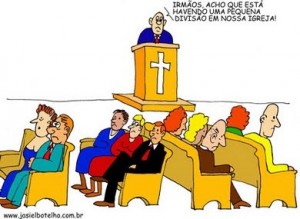

































































































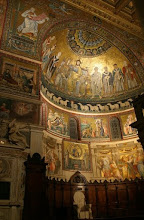































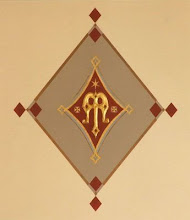
































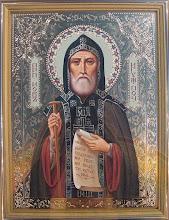






















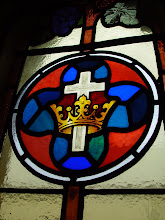



















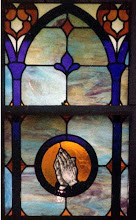









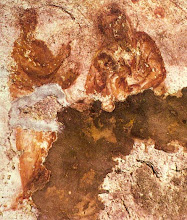

































































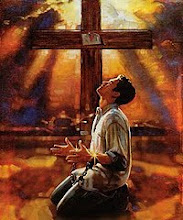






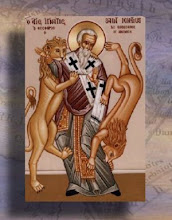



























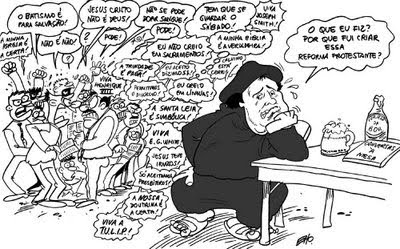



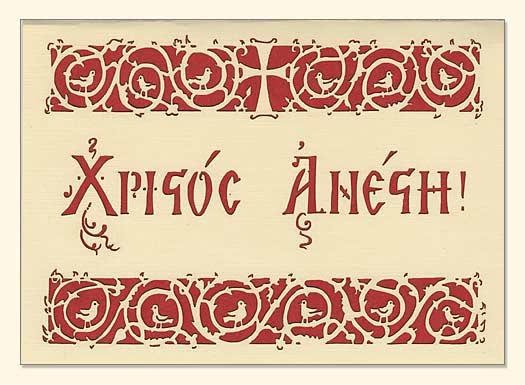












Nenhum comentário:
Postar um comentário